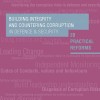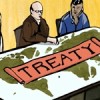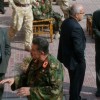Anti-corruption training is not adequately addressed in the majority of countries surveyed in TI-DSP’s Government Defence Anti-Corruption Index. TI-DSP has been addressing this gap through Building Integrity courses which have been delivered to over 600 mid to senior defence staff since 2008. Two recent impact analysis of course alumni found this course has had a […]

Please mind your own business, France!
“Our country is a good student when it comes to passing laws. What is missing is their implementation because of the lack of political will” says Daniel Lebègue, chair of Transparence France. One of the world’s biggest exporters, France is not doing nearly enough to fight and prevent foreign bribery, say the OECD’s and Transparency […]

Addressing defence and security corruption is in everybody’s hands
Citizens who have been victims or witnesses of corruption are realising that the ability to take action is in their hands. They also understand that this fight is not only for their sake, but also on behalf of all the people who are hurt by corruption around the world every day. Taking part in the […]

Passing the corruption car-test
Although tackling corruption is not an auditor’s function, audit processes can sometimes uncover irregularities better than the bodies tasked to do so. Think of it as a car test. Audits are to institutions what a car test is to you and me. Picture yourself in the unavoidable and annoying queue many have to endure every […]

Five challenges when making defence budgets more transparent
Maria Gili and Leah Wawro of Transparency International’s Defence and Security Programme outline obstacles to more transparency and accountability in how countries spend their defence budgets. Defence budgets are the primary tool that legislators and civil society can use to hold their governments and armed forces to account and see how their taxes are […]

Will New EU Defence spending Rules Reduce Corruption ?
Julia Muravska, project officer in Transparency International’s Defence and Security Programme, asks whether EU countries will use new EU laws to tackle corruption in defence spending – or use to fine print to avoid real change. Notorious corruption allegations in the defence sector, such as those surrounding the BAE /SAAB fighter jet sales to South […]

Regaining Trust: Lessons for the Police
Matt Boardman is currently doing an internship at Transparency International’s Defence and Security Programme, and studies History at the University of Cambridge. He has been researching into police corruption and reform. Transparency International’s In Focus article from 4th August notes that the future of post-conflict countries ‘depends to a large extent on the creation of […]

Private sector joins calls for anti-corruption mechanisms in arms trade treaty
As UN Arms Trade Treaty negotiators met in New York last week Tobias Bock from TI’s Defence and Security Programme, warned of the corruption risks that could undermine any result. He and Rob Wright, TI’s senior ATT expert and former UK Head of Export Controls, now look back at the meeting. Last week, the 192 […]

Corruption risks may undermine UN Arms Trade Treaty
By Tobias Bock, Defence and Security Programme, Transparency International Though there are international treaties to control the sale of many goods, from dinosaur bones to postage stamps, there is no such treaty to control the trade in weapons worldwide. From July 11 to July 15, the 192 member states of the United Nations are meeting […]

What makes a good Code of Conduct in the defence sector?
By Leah Wawro and Maria Gili, Transparency International’s Defence and Security Programme. Ministries of Defence and the Armed Forces, often acting in confidentiality and on technically complex issues, are particularly at risk for corruption. It is up to individuals in these institutions to deter corruption with professionalism, integrity, and ethical behaviour, and leaders must provide […]
- State Capture in South Africa 14 February 2017
-
 What’s next for Ukraine?
16 December 2016
What’s next for Ukraine?
16 December 2016
-
 Cleaning up sport: conflicts of interest at the top
9 December 2016
Cleaning up sport: conflicts of interest at the top
9 December 2016
-
 OGP: France must do more to tackle corruption
9 December 2016
OGP: France must do more to tackle corruption
9 December 2016
-
 Pharma companies in Slovakia: Uncovering conflicts of interest
9 December 2016
Pharma companies in Slovakia: Uncovering conflicts of interest
9 December 2016
-
Nokubonga Ndima: Young people can make a change for a better future...
-
Benjamin M: Very good article! Congrats!...
-
arun kottur: In India sports minister was involved decades are ...
-
Ekonomi: Very beneficial article. Thank you very much. htt...
-
ksweeney1: I do not agree that https://apex.aero/2016/09/22/g...
Search
Categories
Latest news from Transparency International
No items, feed is empty.


 Connect with us on Facebook
Connect with us on Facebook Follow us on Twitter
Follow us on Twitter